13 apr 2019
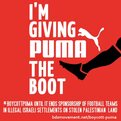
On April 18, Puma shareholders will gather for the company’s Annual General Meeting (AGM).
Let’s make sure Puma’s sponsorship of Israeli war crimes is on the agenda!
Tweet the pledge to give Puma the boot!
Puma is the only international sponsor of the Israel Football Association (IFA), which includes teams in illegal Israeli settlements on occupied Palestinian land.
Puma’s endorsement gives legitimacy to Israel’s illegal settlements pushing Palestinian families off their land and its attacks on Palestinian sports. Israeli snipers ended the careers of dozens of Palestinian athletes in Gaza, in 2018, alone.
Palestinian teams and athletes are calling for a boycott of Puma until it ends its sponsorship of the IFA.
Puma’s own assessment of its human rights track record identified “sponsorship activities” as one of its “weak spots.”
Give Puma the boot! Join social media actions or write to Puma today!
– Tweet the image above and post on Facebook and Instagram
– Write to Puma using the form on the right
Collective action works! Earlier this month, thanks to thousands of you, UNICEF announced it does not support the EuroAsia Interconnector electricity cable plugging Europe into Israel’s illegal settlements. Let’s do this again!
Let’s convince Puma to live up to its claim of supporting equality and social justice!
Palestinian Campaign for the Academic and Cultural Boycott of Israel
PS: Save the Date! International #BoycottPuma Day of Action, June 15, 2019
Form letter at BDS Official.
Let’s make sure Puma’s sponsorship of Israeli war crimes is on the agenda!
Tweet the pledge to give Puma the boot!
Puma is the only international sponsor of the Israel Football Association (IFA), which includes teams in illegal Israeli settlements on occupied Palestinian land.
Puma’s endorsement gives legitimacy to Israel’s illegal settlements pushing Palestinian families off their land and its attacks on Palestinian sports. Israeli snipers ended the careers of dozens of Palestinian athletes in Gaza, in 2018, alone.
Palestinian teams and athletes are calling for a boycott of Puma until it ends its sponsorship of the IFA.
Puma’s own assessment of its human rights track record identified “sponsorship activities” as one of its “weak spots.”
Give Puma the boot! Join social media actions or write to Puma today!
– Tweet the image above and post on Facebook and Instagram
– Write to Puma using the form on the right
Collective action works! Earlier this month, thanks to thousands of you, UNICEF announced it does not support the EuroAsia Interconnector electricity cable plugging Europe into Israel’s illegal settlements. Let’s do this again!
Let’s convince Puma to live up to its claim of supporting equality and social justice!
Palestinian Campaign for the Academic and Cultural Boycott of Israel
PS: Save the Date! International #BoycottPuma Day of Action, June 15, 2019
Form letter at BDS Official.
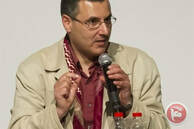
The United States administration denied entry to Omar Barghouti, a Palestinian human rights defender and a co-founder of the Boycott, Divestment and Sanctions (BDS) Movement, this week allegedly due to his political activities.
The Arab American Institute (AII) said that Barghouti was barred from boarding a flight, on Wednesday, from Israel’s Ben Gurion Airport to New York for a speaking tour and his daughter’s wedding, despite having the required Israel-issued travel documents and a valid visa.
AII, which coordinated Barghouti’s US visit, said in a statement that he was informed by airline staff at the Ben Gurion Airport that the US Consulate in Tel Aviv had directed US immigration services to deny his entry.
The statement said Barghouti was not provided an explanation for his denial of entry beyond being told it was an “immigration matter.”
Due to his role in BDS, Barghouti, who is a resident of Acre (Akka) holds Israeli permanent resident status, was barred from leaving Israel several times in recent years, by refusing to renew travel documents, which are automatically granted to Palestinians who do not hold a full Israeli citizenship.
Regarding the denial of entry, Barghouti said in a statement, “This US entry ban against me, which is ideologically and politically motivated, is part of Israel’s escalating repression against Palestinian, Israeli and international human rights defenders in the BDS movement for freedom, justice and equality.”
He added, “Israel is not merely continuing its decades-old system of military occupation, apartheid and ethnic cleansing; it is increasingly outsourcing its outrageous, McCarthyite repression to the US and to xenophobic, far-right cohorts across the world.”
Barghouti accused supporters of what he described as Israeli apartheid in the US of being “desperately trying to deny US lawmakers, media, diverse audiences … of their right to listen, first-hand, to a Palestinian human rights advocate calling for ending US complicity in Israel’s crimes against our people.”
Barghouti explained how devastating it is to be denied the right to attend his own daughter’s wedding, “One thing that this ban deprives me of and that I cannot compensate is the right to be at my US-based daughter’s wedding. I am hurt, but I am not deterred.”
The Boycott, Divestment, and Sanctions (BDS) movement is a global campaign promoting various forms of boycott against Israel until it meets what the campaign describes as "Israel's obligations under international law," which include its withdrawal from the occupied territories, removal of the separation wall in the occupied West Bank, full equality for Arab-Palestinian citizens in Israel, and promotion of the right of return of Palestinian refugees to their homelands, now known as Israel.
The Arab American Institute (AII) said that Barghouti was barred from boarding a flight, on Wednesday, from Israel’s Ben Gurion Airport to New York for a speaking tour and his daughter’s wedding, despite having the required Israel-issued travel documents and a valid visa.
AII, which coordinated Barghouti’s US visit, said in a statement that he was informed by airline staff at the Ben Gurion Airport that the US Consulate in Tel Aviv had directed US immigration services to deny his entry.
The statement said Barghouti was not provided an explanation for his denial of entry beyond being told it was an “immigration matter.”
Due to his role in BDS, Barghouti, who is a resident of Acre (Akka) holds Israeli permanent resident status, was barred from leaving Israel several times in recent years, by refusing to renew travel documents, which are automatically granted to Palestinians who do not hold a full Israeli citizenship.
Regarding the denial of entry, Barghouti said in a statement, “This US entry ban against me, which is ideologically and politically motivated, is part of Israel’s escalating repression against Palestinian, Israeli and international human rights defenders in the BDS movement for freedom, justice and equality.”
He added, “Israel is not merely continuing its decades-old system of military occupation, apartheid and ethnic cleansing; it is increasingly outsourcing its outrageous, McCarthyite repression to the US and to xenophobic, far-right cohorts across the world.”
Barghouti accused supporters of what he described as Israeli apartheid in the US of being “desperately trying to deny US lawmakers, media, diverse audiences … of their right to listen, first-hand, to a Palestinian human rights advocate calling for ending US complicity in Israel’s crimes against our people.”
Barghouti explained how devastating it is to be denied the right to attend his own daughter’s wedding, “One thing that this ban deprives me of and that I cannot compensate is the right to be at my US-based daughter’s wedding. I am hurt, but I am not deterred.”
The Boycott, Divestment, and Sanctions (BDS) movement is a global campaign promoting various forms of boycott against Israel until it meets what the campaign describes as "Israel's obligations under international law," which include its withdrawal from the occupied territories, removal of the separation wall in the occupied West Bank, full equality for Arab-Palestinian citizens in Israel, and promotion of the right of return of Palestinian refugees to their homelands, now known as Israel.
8 apr 2019

American singer-songwriter, Madonna, will perform at the 2019 Eurovision Song Contest, which is due to be held in Tel Aviv, in central Israel, amid calls to boycott the event, on Tuesday.
The European Broadcasting Union confirmed that the 60-year-old singer is set to perform two songs at Eurovision, including a classic track and a new single.
Madonna is expected to be accompanied by a 160-person entourage.
This would be Madonna’s fourth performance in Israel. The first came in 1993, and was followed by concerts in 2009 and 2012.
Nevertheless, Pro-Palestinian groups and organizations such as Palestinian Campaign for the Academic and Cultural Boycott of Israel (PACBI) and Jewish Voice For Peace called on Madonna to cancel her performance at the song contest in Israel in May.
PACBI took to Twitter to send a message to Madonna, telling her performance and star-power “will help cover up Israel’s abuses against the Palestinians.”
PACBI’s tweet read, “Tell Madonna that performing at Eurovision in Israel means lending her star-power to cover up Israel's continued human rights abuses and harms the Palestinian struggle for freedom, justice and equality.”
The tweet came with the hashtag #MadonnaDontGo.
Jewish Voice for Peace also tweeted, “Stay home, Madonna. Lend your voice for freedom.”
The organization also posted a message for the singer on its website titled “Tell Madonna to Choose Freedom,” which said, “There's no neutrality in situations of injustice. Please stand with us on the right side of history to create a better world for all and cancel your performance at Eurovision.
If you believe in equality and dignity for all, you will choose not to lend your star-power to the far-right Israeli government that is using Eurovision to cover up their continued human rights abuses. Your performance at Eurovision will bring harm to the Palestinian struggle for freedom, justice and equality.”
Recently, some 171 Swedish artists and celebrities have signed an open letter urging to boycott the 2019 Eurovision Song Contest and stressed that "as long as Israel, with its apartheid policy, denies the Palestinians their basic human rights, we must renounce all participation in Israeli cultural exchanges.”
In September 2018, over 140 artists from around the world, including six Israeli artists, signed a letter calling for the boycott of the 2019 Eurovision Song Contest and demanding the song contest should be boycotted if it is "hosted by Israel while it continues its grave, decades-old violations of Palestinian human rights."
The European Broadcasting Union confirmed that the 60-year-old singer is set to perform two songs at Eurovision, including a classic track and a new single.
Madonna is expected to be accompanied by a 160-person entourage.
This would be Madonna’s fourth performance in Israel. The first came in 1993, and was followed by concerts in 2009 and 2012.
Nevertheless, Pro-Palestinian groups and organizations such as Palestinian Campaign for the Academic and Cultural Boycott of Israel (PACBI) and Jewish Voice For Peace called on Madonna to cancel her performance at the song contest in Israel in May.
PACBI took to Twitter to send a message to Madonna, telling her performance and star-power “will help cover up Israel’s abuses against the Palestinians.”
PACBI’s tweet read, “Tell Madonna that performing at Eurovision in Israel means lending her star-power to cover up Israel's continued human rights abuses and harms the Palestinian struggle for freedom, justice and equality.”
The tweet came with the hashtag #MadonnaDontGo.
Jewish Voice for Peace also tweeted, “Stay home, Madonna. Lend your voice for freedom.”
The organization also posted a message for the singer on its website titled “Tell Madonna to Choose Freedom,” which said, “There's no neutrality in situations of injustice. Please stand with us on the right side of history to create a better world for all and cancel your performance at Eurovision.
If you believe in equality and dignity for all, you will choose not to lend your star-power to the far-right Israeli government that is using Eurovision to cover up their continued human rights abuses. Your performance at Eurovision will bring harm to the Palestinian struggle for freedom, justice and equality.”
Recently, some 171 Swedish artists and celebrities have signed an open letter urging to boycott the 2019 Eurovision Song Contest and stressed that "as long as Israel, with its apartheid policy, denies the Palestinians their basic human rights, we must renounce all participation in Israeli cultural exchanges.”
In September 2018, over 140 artists from around the world, including six Israeli artists, signed a letter calling for the boycott of the 2019 Eurovision Song Contest and demanding the song contest should be boycotted if it is "hosted by Israel while it continues its grave, decades-old violations of Palestinian human rights."
4 apr 2019
|
|
The UK-based band Slovo has released a new song which calls for a boycott of the Eurovision Song Contest final, which will be held in Tel Aviv on the 18th of May.
Entitled ‘Not My Kinda Party’, the song refers to Israel as an apartheid regime, and lists aspects of the government’s policies, including ‘illegal settlements’ and ‘kids in prison’ followed by the verdict ‘Nul Points’ (a reference to infamous zero score at the Eurovision Song Contest). The song release comes just two days after the announcement of a “Not the Eurovision: Party for Palestine” gig set to be held in London on the same evening of the final of the Eurovision Song Contest, in support of Palestinian rights. The gig, organised by Palestine Solidarity Campaign, will feature a performance from Slovo’s Dave Randall, as well as a live set from |
rapper Mic Righteous and a DJ set from alternative rock band and Mercury Prize-winners Wolf Alice. More acts are yet to be announced.
In 2005, 170 Palestinian civil society groups including trade unions, women’s organisations, community groups and NGOs voted overwhelmingly to issue a call for a boycott of Israeli institutions including a cultural boycott. That call remains in place, and is campaigned for by the Palestinian Boycott National Committee. It is also supported by Israeli activists including the group Boycott From Within. The song release is supported by The Palestine Solidarity Campaign.
Slovo’s bandleader is former Faithless guitarist Dave Randall. He says: ”In 2010 the band Faithless, with whom I played guitar, declined offers to play in Israel, joining the boycott in solidarity with Palestinians. Prior to the call being issued, Faithless did perform in Israel – once at a rave on a beach south of Tel Aviv, and again at a music festival in Haifa.
“I saw with my own eyes that going to Israel and saying progressive things from the stage did nothing to improve the situation for Palestinians. On the contrary, despite our efforts, the gigs may well have had the net effect of distracting fans from the political situation – of ‘art-washing’ apartheid – and appearing more widely to be an endorsement of ‘business as usual’ in the apartheid state.”
In 2005, 170 Palestinian civil society groups including trade unions, women’s organisations, community groups and NGOs voted overwhelmingly to issue a call for a boycott of Israeli institutions including a cultural boycott. That call remains in place, and is campaigned for by the Palestinian Boycott National Committee. It is also supported by Israeli activists including the group Boycott From Within. The song release is supported by The Palestine Solidarity Campaign.
Slovo’s bandleader is former Faithless guitarist Dave Randall. He says: ”In 2010 the band Faithless, with whom I played guitar, declined offers to play in Israel, joining the boycott in solidarity with Palestinians. Prior to the call being issued, Faithless did perform in Israel – once at a rave on a beach south of Tel Aviv, and again at a music festival in Haifa.
“I saw with my own eyes that going to Israel and saying progressive things from the stage did nothing to improve the situation for Palestinians. On the contrary, despite our efforts, the gigs may well have had the net effect of distracting fans from the political situation – of ‘art-washing’ apartheid – and appearing more widely to be an endorsement of ‘business as usual’ in the apartheid state.”
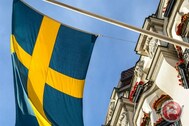
Some 171 Swedish artists and celebrities have signed an open letter urging to boycott the 2019 Eurovision Song Contest, in Tel Aviv, Israel, on Wednesday.
In the open letter, the Swedish signatories said that "Just a few days after the Israeli victory in the Eurovision Song Contest in May 2018, Israel's army killed 62 unarmed Palestinians who protested against their prison-like imprisonment in Gaza. Six of those murdered were children.”
This section of the letter referred to the peaceful protests, known as "The Great March of Return," in which thousands of Palestinians in the besieged Gaza Strip -- which has suffered from a nearly 12-year Israeli siege -- took to the borders to demand their right of return as refugees to their original homelands, now in present-day Israel.
The letter continued, “At the same time, Israeli Prime Minister Benjamin Netanyahu expressed his delight that Netta Barzilai, the winning singer, was the best ambassador for Israel in the world."
“We, Swedish artists and cultural workers who have signed this call, cannot quietly watch Israel use the Eurovision Song Contest to conceal their crimes against the Palestinian people,” the signatories stressed.
The letter concluded, "As long as Israel, with its apartheid policy, denies the Palestinians their basic human rights, we must renounce all participation in Israeli cultural exchanges.”
In response to all the recent calls for a humanitarian boycott, the 2018 Eurovision winner Netta Barzilai claimed it is "not the answer" and "boycotting light spreads darkness."
Members of Hatari, the Icelandic representative band, also signed a petition calling for the boycott and announced its intention to protest on stage, despite it being a violation of the contest's rules.
In September 2018, over 140 artists from around the world, including six Israeli artists, signed a letter calling for the boycott of the 2019 Eurovision Song Contest and demanding the song contest should be boycotted if it is "hosted by Israel while it continues its grave, decades-old violations of Palestinian human rights."
Performing in Israel still remains highly politicized, with many criticizing that Israel's military action towards the Palestinians is more than enough to justify a cultural boycott.
The semifinals of the Eurovision song contest will be held at the Tel Aviv Convention Center on May 14th and 16th, and the finals will be held on May 18th 2019.
It is noteworthy, that hosting the Eurovision Song Contest in Israel is not necessary neither is it the only option to be considered. In 1980, the Israel Broadcasting Authority (IBA) had declined to host the contest in Israel for alleged financial reasons. Hence, the contest was held in The Hague, Netherlands instead.
In the open letter, the Swedish signatories said that "Just a few days after the Israeli victory in the Eurovision Song Contest in May 2018, Israel's army killed 62 unarmed Palestinians who protested against their prison-like imprisonment in Gaza. Six of those murdered were children.”
This section of the letter referred to the peaceful protests, known as "The Great March of Return," in which thousands of Palestinians in the besieged Gaza Strip -- which has suffered from a nearly 12-year Israeli siege -- took to the borders to demand their right of return as refugees to their original homelands, now in present-day Israel.
The letter continued, “At the same time, Israeli Prime Minister Benjamin Netanyahu expressed his delight that Netta Barzilai, the winning singer, was the best ambassador for Israel in the world."
“We, Swedish artists and cultural workers who have signed this call, cannot quietly watch Israel use the Eurovision Song Contest to conceal their crimes against the Palestinian people,” the signatories stressed.
The letter concluded, "As long as Israel, with its apartheid policy, denies the Palestinians their basic human rights, we must renounce all participation in Israeli cultural exchanges.”
In response to all the recent calls for a humanitarian boycott, the 2018 Eurovision winner Netta Barzilai claimed it is "not the answer" and "boycotting light spreads darkness."
Members of Hatari, the Icelandic representative band, also signed a petition calling for the boycott and announced its intention to protest on stage, despite it being a violation of the contest's rules.
In September 2018, over 140 artists from around the world, including six Israeli artists, signed a letter calling for the boycott of the 2019 Eurovision Song Contest and demanding the song contest should be boycotted if it is "hosted by Israel while it continues its grave, decades-old violations of Palestinian human rights."
Performing in Israel still remains highly politicized, with many criticizing that Israel's military action towards the Palestinians is more than enough to justify a cultural boycott.
The semifinals of the Eurovision song contest will be held at the Tel Aviv Convention Center on May 14th and 16th, and the finals will be held on May 18th 2019.
It is noteworthy, that hosting the Eurovision Song Contest in Israel is not necessary neither is it the only option to be considered. In 1980, the Israel Broadcasting Authority (IBA) had declined to host the contest in Israel for alleged financial reasons. Hence, the contest was held in The Hague, Netherlands instead.
26 mar 2019
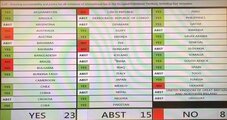
The United Nations Human Rights Council (UN HRC) on Friday voted 23-8 for an arms embargo against Israel and the prosecution of Israeli military officials for war crimes due to Israel’s deliberate targeting of unarmed children, journalists and disabled people during recent protests in the Gaza Strip. Sub-Saharan African nations are among the biggest supporters of the move, with yes votes coming from Angola, Burkina Faso, Nigeria, Senegal, Somalia and South Africa.
Dubbed the “accountability” resolution, the vote in Geneva follows a UN Independent Commission of Inquiry that found the vast majority of Gaza protesters who were killed by Israeli forces - 154 out of 183 people - had been unarmed, and “did not pose an imminent threat of death or serious injury to others when they were shot, nor were they directly participating in hostilities.”
The Israeli government refused to co-operate with UN investigators, and rejected the report’s findings.
The report recommended that UN members consider imposing individual sanctions, such as a travel ban or an assets freeze, on those identified as responsible for the violations of international law and possible war-crimes.
During discussions on this, and other resolutions critical of Israeli human rights violations in the Occupied Palestinian Territories (OPT), African nations defended the Palestinian right to resist occupation through protest, and their right to self-determination.
“Nigeria emphasizes the need for Israel to always exercise utmost restraint and to avoid excessive use of force against innocent civilians exercising their right to protest in resistance to their ongoing occupation,” said Abuja’s representative, Muhammad Isa.
South African representative, Clinton Swemmer, said the report’s findings of possible war-crimes and crimes against humanity were credible, and the South African delegation believes that these “have indeed occurred”.
Seemingly in response to accusations by several European countries that the report did not hold Palestinians responsible, Namibian representative, Penda Naanda said:
“We cannot equate the responsibilities and the accountability of the victims to those of the occupying power….Namibia supports the commission’s request that the current report and the relevant information be submitted to the International Criminal Court.”
Namibia, formerly South West Africa, was occupied by Germany and then apartheid South Africa until 1990.
Speaking on behalf of the 54-member Africa Group at the session, Angola’s Marilia Manuel cautioned that the “the international community cannot continue absolving Israel of its responsibility for its human rights violations against the Palestinians.” Manuel reiterated that the HRC has an ethical and legal obligation to protect the Palestinian people. “African states remain committed to this cause,” she declared.
The accountability resolution was one of several resolutions critical of Israel which the UNHRC approved on Friday as it wrapped up its 40th session.
The resolution on the right of the Palestinian people to self-determination passed 41-3, with two abstentions. The vote on Israeli human rights abuses in the Occupied Palestinian Territories (OPT) passed 39-3, with five abstentions. A resolution against illegal Israeli settlements in the OPT passed 32-5, with ten abstentions.
Palestinian ambassador to the UN HRC, Ibrahim Khreisheh, expressed his support for the move.
“Voting in favor of today's resolutions that condemn Israeli abuses of Palestinian human rights and call for effective mechanisms to end them is an evident fulfilment of your legal and moral responsibilities, as members of the international community, towards international law, UN resolutions, and universal human rights.
The State of Palestine will continue to make use of all available diplomatic and legal tools to exercise its long-overdue inalienable rights, protect our people and hold Israel accountable for over half a century of systematic oppression, domination, and violence,” he said.
Meanwhile, South Africa’s Ambassador to the UNHRC, Nozipho Mxakato-Diseko, warned that the two-state solution is clearly being systematically eroded and replaced with the reality of a one-state solution under apartheid.”
Botswana, Zimbabwe, Senegal, and Djibouti also commented during discussions.
- Source: Afro-Palestine News Wire Service
Dubbed the “accountability” resolution, the vote in Geneva follows a UN Independent Commission of Inquiry that found the vast majority of Gaza protesters who were killed by Israeli forces - 154 out of 183 people - had been unarmed, and “did not pose an imminent threat of death or serious injury to others when they were shot, nor were they directly participating in hostilities.”
The Israeli government refused to co-operate with UN investigators, and rejected the report’s findings.
The report recommended that UN members consider imposing individual sanctions, such as a travel ban or an assets freeze, on those identified as responsible for the violations of international law and possible war-crimes.
During discussions on this, and other resolutions critical of Israeli human rights violations in the Occupied Palestinian Territories (OPT), African nations defended the Palestinian right to resist occupation through protest, and their right to self-determination.
“Nigeria emphasizes the need for Israel to always exercise utmost restraint and to avoid excessive use of force against innocent civilians exercising their right to protest in resistance to their ongoing occupation,” said Abuja’s representative, Muhammad Isa.
South African representative, Clinton Swemmer, said the report’s findings of possible war-crimes and crimes against humanity were credible, and the South African delegation believes that these “have indeed occurred”.
Seemingly in response to accusations by several European countries that the report did not hold Palestinians responsible, Namibian representative, Penda Naanda said:
“We cannot equate the responsibilities and the accountability of the victims to those of the occupying power….Namibia supports the commission’s request that the current report and the relevant information be submitted to the International Criminal Court.”
Namibia, formerly South West Africa, was occupied by Germany and then apartheid South Africa until 1990.
Speaking on behalf of the 54-member Africa Group at the session, Angola’s Marilia Manuel cautioned that the “the international community cannot continue absolving Israel of its responsibility for its human rights violations against the Palestinians.” Manuel reiterated that the HRC has an ethical and legal obligation to protect the Palestinian people. “African states remain committed to this cause,” she declared.
The accountability resolution was one of several resolutions critical of Israel which the UNHRC approved on Friday as it wrapped up its 40th session.
The resolution on the right of the Palestinian people to self-determination passed 41-3, with two abstentions. The vote on Israeli human rights abuses in the Occupied Palestinian Territories (OPT) passed 39-3, with five abstentions. A resolution against illegal Israeli settlements in the OPT passed 32-5, with ten abstentions.
Palestinian ambassador to the UN HRC, Ibrahim Khreisheh, expressed his support for the move.
“Voting in favor of today's resolutions that condemn Israeli abuses of Palestinian human rights and call for effective mechanisms to end them is an evident fulfilment of your legal and moral responsibilities, as members of the international community, towards international law, UN resolutions, and universal human rights.
The State of Palestine will continue to make use of all available diplomatic and legal tools to exercise its long-overdue inalienable rights, protect our people and hold Israel accountable for over half a century of systematic oppression, domination, and violence,” he said.
Meanwhile, South Africa’s Ambassador to the UNHRC, Nozipho Mxakato-Diseko, warned that the two-state solution is clearly being systematically eroded and replaced with the reality of a one-state solution under apartheid.”
Botswana, Zimbabwe, Senegal, and Djibouti also commented during discussions.
- Source: Afro-Palestine News Wire Service
19 mar 2019
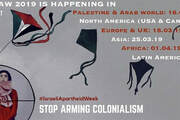
The 15th annual Israeli Apartheid Week (IAW), the largest global Boycott, Divestment and Sanctions (BDS) mobilization for Palestinian rights, opened on Tuesday with more than 80 events in 40 cities across Europe, North America, and Palestine, featuring protests, lectures, film screenings, and cultural events.
According to a press release, Israeli Apartheid Week is expected to be held in more than 200 cities worldwide.
IAW officially launched over the weekend in the central occupied West Bank city of al-Bireh, where the Palestinian BDS National Committee (BNC) convened the Sixth National BDS Conference, a gathering with over 900 participants.
The large BDS Conference in Palestine and worldwide IAW mobilization in support of Palestinian human rights are taking place against the backdrop of the far-right Israeli government's public admission of its legalized and institutionalized racist rule over Palestinians.
Last week, Israeli Prime Minister Benjamin Netanyahu helped make the case for labeling the Israeli regime as apartheid and said, "Israel is not a state of all its citizens. According to the basic nationality law we passed, Israel is the nation-state of the Jewish people – and only it.”
Israel's new Nation-State Law is an example of a number of Israeli laws that systematically enshrine in Israel’s legal framework racial discrimination against Palestinians living in the Occupied Palestinian Territory (OPT), as citizens of Israel and in exile, fitting the definition of apartheid under international law.
Ana Sanchez, International Campaigns Officer with the BNC, said “Israel's decades-old oppression of Palestinians is increasingly understood for what it’s always been-- exclusionary and racist. Israeli Apartheid Week events across five continents demonstrate the rapidly growing grassroots support for the nonviolent, anti-racist and intersectional struggle for Palestinian freedom, justice and equality.”
Sanchez stressed, “Despite efforts by political leaders to repress it, BDS is inspiring Palestinian and international activists, academics, artists, feminists, students, church organizers, racial and social justice movements, LGBTQ advocates, and others to act in the pursuit of our respective inalienable rights. United we shall overcome.”
IAW 2019 focuses on the demand for a global military embargo on Israel after BDS activists asserted that the justification for this demand was provided by the UN report on “The Gaza March of Return,” which found that Israel may have committed crimes against humanity by killing scores of Palestinians and injuring thousands of others in weekly protests.
The Palestinian civil society, Amnesty International, the UK Labor Party, and other civil society groups have all called for a military embargo on Israel.
IAW is an international series of events raising awareness about Israel’s apartheid regime over the Palestinian people and building support for the nonviolent BDS movement. Many additional IAW events in Asia, Africa and Latin America, where IAW runs from March 24th to April 13th, will be added to the more than 80 IAW events currently on the IAW calendar.
According to a press release, Israeli Apartheid Week is expected to be held in more than 200 cities worldwide.
IAW officially launched over the weekend in the central occupied West Bank city of al-Bireh, where the Palestinian BDS National Committee (BNC) convened the Sixth National BDS Conference, a gathering with over 900 participants.
The large BDS Conference in Palestine and worldwide IAW mobilization in support of Palestinian human rights are taking place against the backdrop of the far-right Israeli government's public admission of its legalized and institutionalized racist rule over Palestinians.
Last week, Israeli Prime Minister Benjamin Netanyahu helped make the case for labeling the Israeli regime as apartheid and said, "Israel is not a state of all its citizens. According to the basic nationality law we passed, Israel is the nation-state of the Jewish people – and only it.”
Israel's new Nation-State Law is an example of a number of Israeli laws that systematically enshrine in Israel’s legal framework racial discrimination against Palestinians living in the Occupied Palestinian Territory (OPT), as citizens of Israel and in exile, fitting the definition of apartheid under international law.
Ana Sanchez, International Campaigns Officer with the BNC, said “Israel's decades-old oppression of Palestinians is increasingly understood for what it’s always been-- exclusionary and racist. Israeli Apartheid Week events across five continents demonstrate the rapidly growing grassroots support for the nonviolent, anti-racist and intersectional struggle for Palestinian freedom, justice and equality.”
Sanchez stressed, “Despite efforts by political leaders to repress it, BDS is inspiring Palestinian and international activists, academics, artists, feminists, students, church organizers, racial and social justice movements, LGBTQ advocates, and others to act in the pursuit of our respective inalienable rights. United we shall overcome.”
IAW 2019 focuses on the demand for a global military embargo on Israel after BDS activists asserted that the justification for this demand was provided by the UN report on “The Gaza March of Return,” which found that Israel may have committed crimes against humanity by killing scores of Palestinians and injuring thousands of others in weekly protests.
The Palestinian civil society, Amnesty International, the UK Labor Party, and other civil society groups have all called for a military embargo on Israel.
IAW is an international series of events raising awareness about Israel’s apartheid regime over the Palestinian people and building support for the nonviolent BDS movement. Many additional IAW events in Asia, Africa and Latin America, where IAW runs from March 24th to April 13th, will be added to the more than 80 IAW events currently on the IAW calendar.
